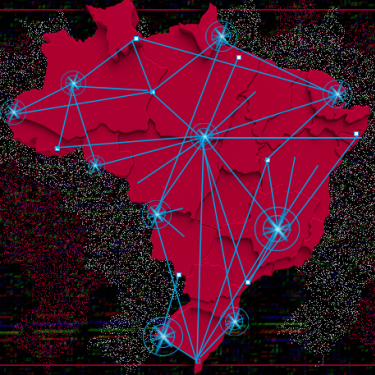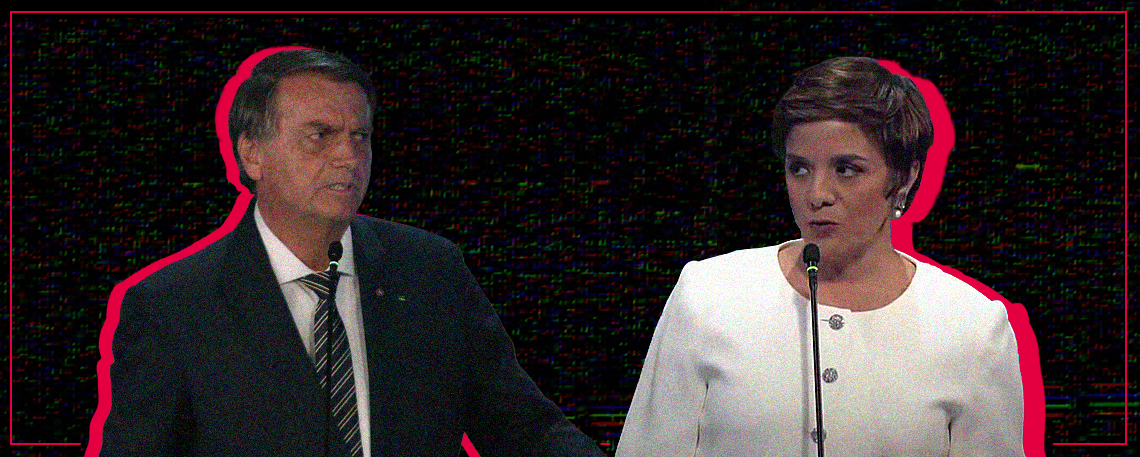Press under pressure in Brazil - RSF analyzes online attacks against journalists during the presidential elections

- Press under pressure in Brazil - RSF analyzes online attacks against journalists during the presidential elections
- Presentation
- Highlights
- Weekly Analysis
- About the project
Presentation
Insults, threats, smear campaigns and other displays of hostility towards journalists and the media have intensified in recent years in Brazil, and are now often heard in the speeches of politicians, government officials and their supporters. Social media are used as echo chambers for these attacks and have become a minefield for journalists. This trend has had a negative impact not only on the work and personal lives of journalists but also the health of the public debate and the right to press freedom in Brazil.
During the current election campaign (from 15 August to 30 October), Reporters Without Borders (RSF) is systematically monitoring social media, in particular Twitter, in order to analyse the extent and underlying patterns of this growing hostility to journalism. RSF will monitor 120 journalists and commentators, and the posts of government officials and election candidates every day until the end of the second round in partnership with the Laboratory for Image and Cyberculture Studies (LABIC), a leading research centre specialising in social media analysis and digital trends that is attached to the Federal State University of Espirito Santo.
RSF will publish weekly analyses of the data collected on this page.
“Systematic monitoring and in-depth analysis of online attacks against the media are essential in order to better understand the digital arena’s role in shaping violence against journalists in Brazil, and to consider more effective solutions to combat this phenomenon
Summary of first month of Brazil’s presidential campaign
- During the first month, 2,865,845 attacks against the media and journalists – using 264 insulting hashtags – were registered on social media. This represents more than one attack per second since the start of the election campaign on 16 August.
- The most used hashtags during this period were #globolixo (mentioned 401,973 times), #globolixoderretendo (15,741), #cnnlixo (5,686), #globosta (1,026), #uolixo (876), #bandlixo (531), #folhalixo (481) and #imprensalixo (460). “Lixo” means “trash” or “garbage” in Portuguese.
- The journalists targeted the most by insulting messages during this period were Vera Magalhães (26,706 attacks), Miriam Leitão (3,832), William Bonner (1,650), Andréia Sadi (1,550), Eliane Cantanhêde (1,468), Milton Neves (1,279), Mônica Bergamo (1,198), Ricardo Noblat (891), Reinaldo Azevedo (793) and Renata Vasconcellos (458).
- The online attacks peaked during the week from 22 to 28 August , when the presidential candidates were interviewed individually on “Jornal Nacional” (Brazil’s most popular evening TV news programme) and presidential candidate debates were televised by Rede Globo.
- Vera Magalhães, TV Cultura’s star anchor, was the target of the most online attacks during the first month of the campaign, with nearly 27,000 attacks on Twitter alone. After President Bolsonaro attacked her verbally during the TV Bandeirantes debate on 28 August, the hashtag #VeraVergonhadoJornalismo (#VeraJournalism’sDisgrace) was shared more than 10,000 times in the space of a few hours and became the third most widely used hashtag during this period. Finally, the expression “Verba Magalhães,” a reference to false information about her TV Cultura salary, was mentioned 10,816 times on Twitter on the day after the debate.
- Women journalists (reporters, anchors and columnists) were the targets of 88% of the attacks on the ten most targeted journalists during this period. On the whole, these attacks were centred on misogynistic terms, personal insults and disinformation.
- In online posts, the following were the terms most widely used to insult and denigrate journalists and media outlets: activist, slut, cow, filth, crook, idiot, newsnazi, ridiculous, hooligan, old, ugly, grandad and communist.
- The most widely followed Twitter profiles that were the most virulent in their attacks on journalists included Leandro Ruschel, a supporter of President Bolsonaro, and Paulo Figueiredo Filho, a commentator on TV Jovem Pan. But there are other less well known or anonymous ones such as @antonioalvespho, @anderson_a_mach and @machadoands. They are all fervent advocates of Jair Bolsonaro, what he thinks and what he is proposing.
- The tweets that individually reach the most profiles are those posted by politicians and presidential candidates. A message posted by President Bolsonaro about CNN Brazil commentator and anchor Gabriela Prioli on 1 September was retweeted 13,000 times and reached more than 13 million people.
Weekly Analysis
Comments by Brazil’s presidential candidates on TV trigger wave of attacks against media
22dn to 29th of August

During the second week of the election campaign, from 22 to 28 August, RSF and the Laboratory for Image and Cyberculture Studies (LABIC) registered nearly 2.8 million attacks against the Brazilian media on Twitter, and tallied 140 insulting hashtags targeting journalists or media outlets that were mentioned in 937,870 tweets.
The anchors of “Jornal Nacional” (Brazil’s most popular evening news programme, on TV Globo), Renata Vasconcellos and William Bonner, were especially targeted after interviewing six of the 12 presidential candidates between 22 and 26 August. The most striking episode of the week, however, was the wave of attacks against the journalist Vera Magalhães during the presidential debate on TV Bandeirantes on 28 August. Asked by Magalhães about his handling of the pandemic and disinformation, President Jair Bolsonaro replied: “I think you think of me in your sleep. You cannot take sides in a debate like this by making false accusations about me. You are a disgrace to Brazilian journalism.” This comment by the president, who is seeking a second term in this election, triggered an immediate avalanche of tweets attacking Magalhães, TV Cultura’s star anchor.
About the project
With support from the Canada Fund for Local Initiatives (CFLI), RSF’s Latin America bureau will monitor, analyse and denounce online attacks against journalists during the campaign in partnership with the Laboratory for Image and Cyberculture Studies (LABIC), a leading research centre specialising in social media analysis and digital trends that is attached to the Federal State University of Espirito Santo.
More than 100 Twitter and Facebook accounts of journalists, public authorities and election candidates, at both federal and local level, will be scrutinised daily from 16 August to 16 November. The most widely used offensive and derogatory hashtags, expressions and insults on social media will also be closely examined.

